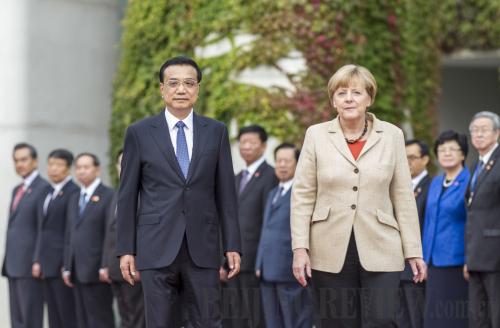Innovative diplomacy
- By Bai Shi
 0 Comment(s)
0 Comment(s) Print
Print E-mail Beijing Review, October 20, 2014
E-mail Beijing Review, October 20, 2014
Chinese Premier Li Keqiang paid an official visit to three European countries—Germany, Russia and Italy—between October 9 and 18.
|
|
|
German Chancellor Angela Merkel hosts a welcome ceremony for visiting Chinese Premier Li Keqiang in Berlin on October 10 [Xie Huanchi] |
In addition to a good number of diplomatic talks during the visit, Li attended the third round of China-Germany Governmental Consultations in Berlin, the 19th China-Russia Prime Ministers' Regular Meeting in Moscow and the 10th Asia-Europe Meeting (ASEM) Summit in Milan in that order.
"Various regular meeting mechanisms have played an important role in Chinese diplomacy. Regular high-level meetings can make sure consensus and agreements reached by leaders are implemented on schedule," said Xiong Wei, an associate professor at the China Foreign Affairs University in Beijing.
Compared with other forms of consultation, the regular meeting mechanism has a strong advantage, according to Cui Hongjian, Director of the Department for European Studies under the China Institute of International Studies (CIIS). "At a regular meeting, both sides will not only engage in discussion to resolve issues but also map out a plan for the future. If the two sides reach consensus on many issues, they are then willing to make efforts to realize their objective," he said.
"Furthermore, the prime ministers' regular meetings have always been characterized by a high degree of efficiency. Co-chaired by two prime ministers, departments of the two cabinets talk to each other directly. Both sides can find a solution to a problem or resolve a difference promptly at such a meeting," Cui said.
Innovative partnership
On October 10, Li and German Chancellor Angela Merkel jointly announced plans to build an innovative partnership of mutual benefit with emphasis on innovation cooperation at a press conference in Berlin.
An action plan was issued following the Li-Merkel meeting, which sets out the main areas of China-Germany innovative cooperation, including a Germany-initiated strategic hi-tech project dubbed "Industry 4.0," as well as urbanization, industrialization, information technology and agricultural modernization, which are among China's policy priorities.
According to Chinese Ambassador to Germany Shi Mingde, Germany will be the first country to develop all-round innovation cooperation with China.







Go to Forum >>0 Comment(s)